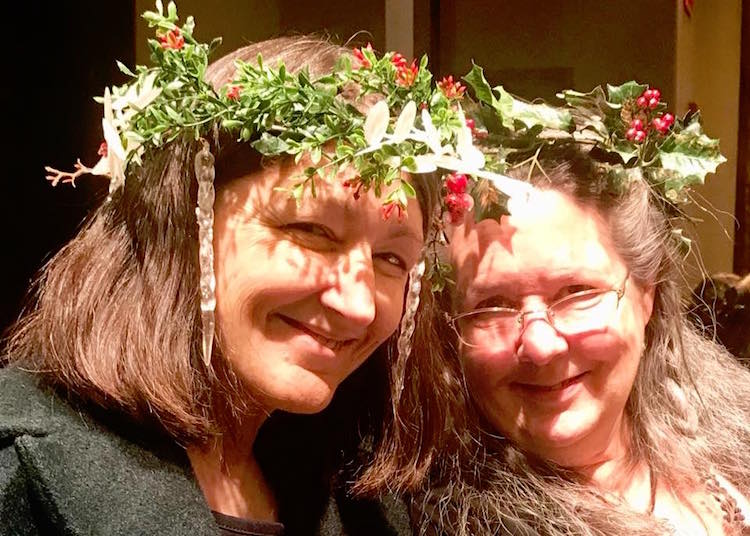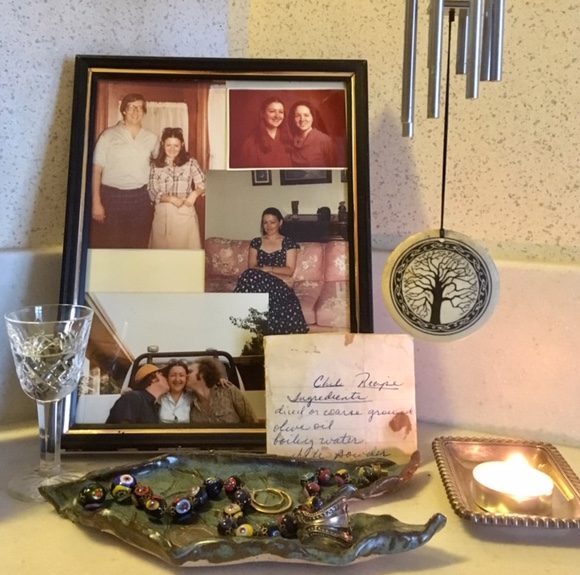I want to tell her story but I can’t, or at least not all of it, because it’s not mine to tell. Only the parts of her life’s fabric that were stitched up alongside mine until they unraveled each from the other, the connective thread unspooling and drifting like a shredded spiderweb carried whithersoever the breeze might take it. SNICK went the blade and my sister is dead. A seam is torn deep within me, puckered and pocked, and I have become a remnant.

She knew she was sick but had routinely downplayed the severity of her illness. We lived literally 1,000 miles apart, and so I was dependent on whatever information she chose to share with me, whenever she could share it with me. She had so many infections by the time she landed in the hospital early this year—infections in her stomach, her blood, her colon, her lungs, and always, always whatever it was that was going on with her liver. I’d ask her repeatedly what her doctors were saying about where all these infections had come from, but she was evasive and would change the subject.
She did tell me about the colon resection she had in March. She did not tell me of her cancer diagnosis. The first week of October she did tell me that spots had been found on her liver. She did not tell me that over the summer the cancer from her colon had metastasized.
As children we would slip into each other’s beds after our mother had turned out the lights and left our room, whispering little-girl secrets and big-girl dreams to each other, the air under the covers growing humid and warm as we breathed each other in. We were unusually close—practically twins with only 17 months between us—and became even more so as our parents’ marriage imploded. We became foxhole sisters, dodging the emotional shrapnel lobbed all around us. Inseparable. Fiercely loyal. Protective.
We grew up, married, our attention shifting to separate, separated lives of spouses and jobs and children. As the years slid by her husband became more controlling, more jealous of her time, more demanding of her focus. She slipped away from me in those years, increasingly trapped in an environment that transformed her into an uncertain, hesitant shell of who she used to be. Consistently belittled and ridiculed, I sometimes wondered if she had hidden herself so far down into her own protective foxhole that she somehow lost herself. I talked to her about leaving him, but she would—or could—not. She would bide her time, she said, until the children were out of the house.
Five days before she died her husband told me she had been enduring cancer for nine months. Three days later, as my plane landed, she had a stroke. He drove her to the emergency room (an ambulance would cost too much and besides, he could get her there just fine, thank you) and I arrived at her bedside about 30 minutes later. Her eyes were citrine yellow, her teeth rimed with blackened, dried blood. Her belly was distended and taut, her ribs protruding in sharp profile from the sunken, sallow skin sagging heavily between them. She smiled when she saw me and told me she was glad I was there.
Her speech became garbled soon after that. I don’t know what she was trying to tell us. She knew we couldn’t understand her. She’d close her eyes and gently shake her head in resignation, then try again. Her daughter kept vigil overnight; in the morning when I came in the room my sister opened her eyes briefly but could do no more than that. Her sisters-in-law came, then her son and husband. He ordered us to leave the room. A few minutes later he opened the door and told us she was dying, allowing us back in. He was the last person she saw as she died.
You may wonder what any of this has to do with paganism, the gods, the goddesses. Maybe this isn’t what you signed up for; perhaps you’re looking for tips on spell-casting or which crystal to use or how to hex someone. Maybe you’re looking for ways to validate whether or not you’re a “real” witch. Maybe you’re more into Witch as an aesthetic or Witch as an expression of feminista empowerment. And I’m not knocking any of those things, but it’s not where my heart has been these days.
My heart has been held, gently and loosely, by Hekate as I’ve navigated Laura’s dying and its aftermath. Gently and loosely, because I’ve been doing hard work that is mine alone to do. Hekate is not there to do my heavy lifting. She’s there as a Companion, a Guide, a Resource as I lean into trusting Her to be there for me. I pray a modified Druid’s Prayer to Her—lately way more than once a day—asking for Her protection, for strength, wisdom and the knowledge of justice. I ask that in the knowledge of justice I may come to love it, and through the love of justice that I may know the love of all existences, and through the love of all existences, the love of Hekate. It’s this prayer that has centered me to be a calm presence and to lead with compassion during these awful weeks.
Because I trust in Her protection, I was able to interact with my brother-in-law without devolving into attacking or defensiveness. He cannot hurt me, and he certainly cannot hurt Laura anymore. Because Hekate strengthened me, I was able to gently wipe the foam from Laura’s lips as her spirit passed from her body. I was able to stroke her hair and tell her she was doing a good job, that she was a good girl, that she would be okay—able to companion her as Hekate companions me—while she passed through that scary crossroad to the other side. Because I have asked Hekate for wisdom, and the knowledge and love of justice, I am more easily able to release my urges to bring vengeance down upon Laura’s husband. I know there will be justice. I do not have to serve it. Because I have asked to know a love of all existences, I know Laura is never far from me; in fact, in these past weeks she and I have been closer than we’ve been in decades. Her husband no longer stands between us.
I wasn’t able to go to her funeral; he scheduled it for the exact time that I had told him I wouldn’t be able to attend. I’m told he used a photo she hated to represent her and that Freebird and The Battle Hymn of The Republic were the pieces of music he chose. In the end it doesn’t matter, none of it matters. Laura is elsewhere.
I’ve created an altar for her, with photos from happier times, a copy of our grandfather’s chili recipe that she hand-wrote for me, a few glass beads from a necklace we each received as a gift in high school, one of my mother’s earrings—she and Laura were so close to each other. There’s a spoon ring we took turns wearing back in the heyday of spoon rings (which was right around the heyday of mood rings), and a 20-pence piece from our college trip to England. Every couple of days I refresh her crystal aperitif glass (currently she’s enjoying an Australian Chardonnay), and every night I light a candle and speak a blessing I read in Raven Reed Starr’s Piercing the Veil of Grief and Loss, which was reposted on Patheos a few days after Laura died: “May your next life treat you more gently than this one did. I love you.” Sometimes I add a few words. The other night I told her to make better choices. I suppose even in death I am still the Big Sister. Lately I’ve been asking her why she didn’t let me walk this journey with her. I suppose that may be something Hekate wonders from time to time as well.
Laura was 59. She will always be my baby sister. I pray her next life treats her more gently than this one did. I love her. And I miss her terribly.















